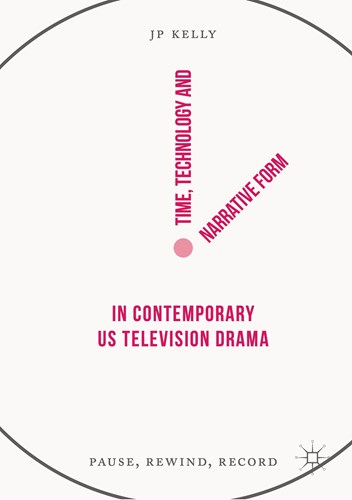Professor James Bennett
Bennett’s Multiplatforming Public Service Broadcasting and 'Social Media as Television Production Technology' are both concerned with what happens to production cultures, processes, business models and aesthetics when long-established media, television and film, encounter new, interactive and participatory digital media forms. Whilst Multiplatforming Public Service Broadcasting looked at how the BBC and Channel 4 adapted to rise of the Internet and audiences’ uptake of interactive digital services, 'Social Media as Television Production Technology' examined the prolifieration of social media as a tool used by TV producers.
Across this work James Bennett has been interested to chart, understand, challenge and practically change how “linear production” engages with the opportunities and affordances of interactive and digital platforms. As a result, both publications are ‘industry reports’, launched in collaboration with key industry partners, including the BBC, Channel 4 and Pact – the Producers’ Alliance of Cinema and Television – in each case. Key findings in both instances examined the barriers to innovation, to digital-TV collaborations, the distance between strategy and implementation and the difficulties involved in aligning linear and interactive timelines and production processes. Each report makes a series of recommendations for the development of TV-Digital inter-relations as both a commercial and public service opportunity for the sector.
Collectively Bennett’s work offers some understandings of the chaotic, creative and challenging nature of change in television and screen industries production cultures. In so doing he has attempted to take an applied approach to researching creative industries, working with the sector rather than about it.
The themes in the above works are continued in his current work as Director of the StoryFutures and StoryFutures Academy projects on immersive technologies.
Professor John Ellis
There’s a mystery at the heart of film and TV production studies: what is ‘content acquisition’; how do film crews work together; how do they organise their work within the complicated process of creating an audiovisual text? John Ellis’s long article “Filming for Television: How a 16mm Film Crew Worked Together” attempts to solve this mystery.
Using an approach derived from phenomenology, the article analyses the 20 minutes of work undertaken by a veteran film crew to set up a simple interview shoot, using the 16mm film equipment that was current early in their careers.
This instance of hands on memory work was created for the ADAPT research project using an innovative method that is outlined in essays by Ellis and Murphy in Hands on Media History: A new methodology in the humanities and social sciences, eds. Nick Hall, John Ellis (Routledge 2020).
The article unpacks the professional routines and relationships of both people and technology that are at the core of television production. It reveals:
- how the crew ‘naturally’ lapsed back into habitual working practices and physical routines with the equipment
- the moments of forgetting and the occasional difficulties presented by replaying their past selves
- the constraints and affordances that defined the nature of analogue television material.
The article makes full use of the affordances of peer reviewed online publication offered by VIEW, the Journal of European Television and Culture.
Professor John Hill
Rediscovering Forgotten Television Drama
As part of the AHRC-funded research project ‘The History of Forgotten Television Drama in the UK’ John Hill has been involved in researching television drama that is little-known or critically neglected. He is particularly interested in the history of television drama and Northern Ireland and his essay ‘Dominic Behan and the Beginnings of Troubles Drama’ examines the largely forgotten work of Brendan Behan’s younger brother, Dominic, who was responsible for some of the first television plays to address the Northern Ireland situation in the post-1969 era. Focusing on productions such as The Patriot Game (1969), Carson Country (1972) and The Folk Singer (1972), Hill argues that these are unjustly neglected works that employ self-conscious artifice and the mixing of artistic conventions to engage with Irish history and politics in an imaginative and innovative way.
Hill has also been concerned to rescue such work from the archive vaults and make them available to contemporary audiences. With the help of the BFI and Kaleidoscope, for example, he was responsible for the restoration of The Patriot Game which was then shown for the first time in Northern Ireland in 2015, having previously been refused transmission by Ulster Television at the time of its production.
Find out more about the Forgotten Television Drama project here.
For more on Professor John Hill’s publications, see his RHUL page.
Dr JP Kelly
Time, Technology and Narrative Form in Contemporary US Television Drama (2017, Palgrave)
Time, Technology and Narrative Form in Contemporary US TV Drama examines how television has been transformed over the past twenty years by the introduction of new viewing technologies including DVDs, DVRs and streaming services such as Netflix, Hulu and Amazon Prime. In doing so, it demonstrates that these platforms have profoundly altered the ways we access and watch television, enabling viewers to pause, rewind, record and archive the once irreversible flow of broadcast TV.
In particular, Kelly argues that changes in the technological landscape of television has encouraged the production of narrative forms that both explore and embody new industrial temporalities. Focusing on US television but also considering the role of TV within a global marketplace, he identifies three distinct narrative temporalities: “acceleration” (24; Prison Break), “complexity” (Lost; FlashForward), and “retrospection” (Mad Men). Through industrial-textual analyses of television shows, this cross-disciplinary study locates these narrative temporalities in their socio-cultural contexts and examines connections between production, distribution, and narrative form in the contemporary television industry.

Big Data and the Small Screen
Kelly's current research examines the impact of data (and big data) on the television industry. This includes two recent peer-reviewed journal articles:
- 'Television by the numbers: the challenges of audience measurement in the age of Big Data' (2017) in Convergence: The International Journal of Research into New Media Technologies
- '"This Title is No Longer Available": Preserving Television in the Streaming Age' (2020) in Television & New Media
Helen Littleboy
Hospital, an award winning television documentary series that exposes the impact of lack of resources and ever-increasing demands on the NHS for both clinicians and patients, was first broadcast on BBC2 in January 2017. Executive produced by Helen Littleboy, the series of six films were shot by multiple crews over six weeks at St Mary’s and other hospitals in the Imperial College Healthcare Trust in West London. Its combination of dramatic storytelling techniques with fast turnaround production, which brought the films to screen in a matter of weeks, drew high critical and audience acclaim and an average of 2.5 million viewers per programme.
From episode one, which reveals how one patient’s urgent cancer surgery is cancelled to give way to another life and death trauma case, to subsequent films focusing on adult social care, privatisation and overseas patients (so-called ‘health tourism’), clinicians talk with rare candour about a system in crisis and its consequences not only for patients but on their own professional and personal lives. As Head of Intensive Care Unit, Simon Ashworth, says "It does feel to me like the elastic is a bit nearer to breaking now than it perhaps ever was. Everyone thinks what they’re doing is important and guess what, everybody’s right”.
Exposing acute behind the scene pressures for the first time on British television led to high levels of audience engagement on social media and calls for action. “Everyone should watch it / then complain to Theresa May and Jeremy Hunt” (Radio Times). Hospital was also praised for its storytelling craft: “its nail-biting twists and powerful emotional pull […] could pass as top-drawer medical drama” (Daily Telegraph.)Hospital was awarded the Royal Television Society Best Documentary Series and was nominated for Bafta and Grierson awards.





















